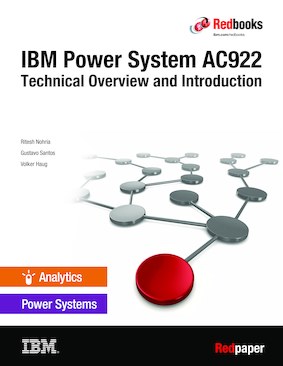Abstract
This IBM® Redpaper™ publication is a comprehensive guide that covers the IBM Power System AC922 server (8335-GTH and 8335-GTX models). The Power AC922 server is the next generation of the IBM POWER® processor-based systems, which are designed for deep learning (DL) and artificial intelligence (AI), high-performance analytics, and high-performance computing (HPC).
This paper introduces the major innovative Power AC922 server features and their relevant functions:
- Powerful IBM POWER9™ processors that offer up to 22 cores at up to 2.80 GHz (3.10 GHz turbo) performance with up to 2 TB of memory.
- IBM Coherent Accelerator Processor Interface (CAPI) 2.0, IBM OpenCAPI™, and second-generation NVIDIA NVLink 2.0 technology for exceptional processor to accelerator intercommunication.
- Up to six dedicated NVIDIA Tesla V100 graphics processing units (GPUs).
This publication is for professionals who want to acquire a better understanding of IBM Power Systems™ products and is intended for the following audiences:
- Clients
- Sales and marketing professionals
- Technical support professionals
- IBM Business Partners
- Independent software vendors (ISVs)
This paper expands the set of IBM Power Systems documentation by providing a desktop reference that offers a detailed technical description of the Power AC922 server.
This paper does not replace the current marketing materials and configuration tools. It is intended as an extra source of information that, together with existing sources, can be used to enhance your knowledge of IBM server solutions.
Table of Contents
Chapter 1. Product summary
Chapter 2. System architecture
Chapter 3. Physical infrastructure
Appendix A. IBM PowerAI
